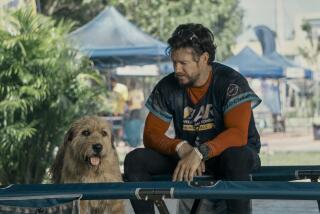Television review: ‘Hachi: A Dog’s Tale’
- Share via
The packet that arrived from the Hallmark Channel with the screener for “Hachi: A Dog’s Tale” was topped by a faux hand-written note insisting, in an almost threatening manner: “This time you will cry for real.” It also included this odd statement: “ Richard Gere has no explanation as to why the critically acclaimed film did not get a U.S. theatrical window.”
True, the film has made more than $40 million worldwide, but after watching it, the explanation seems abundantly clear. “Hachi: A Dog’s Tale” is based on the true story of an Akita so devoted to his master that he waited for him each day at a Tokyo train station. After the man, a Japanese college professor, died in 1925, the dog continued his daily vigil for nine years until his death. A series of newspaper stories turned Hachiko into a national symbol for loyalty; a bronze statue of him was erected in the place where he had so patiently waited.
But the things that make a great newspaper story are not necessarily the same things that make a great film, no matter how hard everyone tries. And everyone tries hard in “Hachi.”
Director Lasse Hallström (“The Cider House Rules,” “My Life as a Dog”) and writer Stephen P. Lindsey are to be admired for their firm anti-”Marley & Me” stance. Their tale is simple, told through a child describing his grandfather’s dog as his “hero.” Coming home one night by train, college music professor Parker Wilson (Gere) finds an Akita puppy who has busted out of his unlabeled crate. The train station manager (played, for no apparent reason, by Jason Alexander) wants nothing to do with the dog, and so Parker takes him home to his inexplicably irritated wife, Cate ( Joan Allen).
Exuding his not inconsiderable charm, Gere makes Parker boyish enough to put a dirty ball in his mouth in an attempt to teach Hachi to fetch. Cate inevitably melts, allowing her husband to keep the dog, which, Parker discovers through his wise Japanese professor buddy, Ken ( Cary-Hiroyuki Tagawa), is a rare breed, known for its singular ability to read and bond with people.
Hachi quickly grows in size and devotion, accompanying Parker to the train station every morning and greeting him with heart-warming joy each evening. At times, Hallström gives us a black-and-white glimpse of a dog’s-eye view, which, if nothing else, breaks the monotony of the Parkers’ seemingly idyllic academic-in-white-farmhouse existence. It rains, it snows, Hachi jumps for joy when Parker shows up.
Then Parker dies unexpectedly, and Hachi begins his famous vigil. The community realizes what is happening and commuters begin leaving money and food; soon there is a newspaper article about the dog who waits.
The dogs who play Hachi are lovely to look at, expressive in a cool, almost intellectual way that more promiscuously affectionate breeds, like golden retrievers, are not. But watching a dog wait day after day has its cinematic limitations, which are quickly reached. Even more disturbing is the nature of the film’s theme, especially couched as a boy’s definition of heroism: Hachi’s world ends with the death of his master. He cannot move on, emotionally or literally, cannot transfer his affections even to Cate, which makes his tale, at least in Western terms, much more tragic than inspiring.
But you will cry, for real. Guaranteed.
mary.mcnamara@latimes.com
More to Read
The complete guide to home viewing
Get Screen Gab for everything about the TV shows and streaming movies everyone’s talking about.
You may occasionally receive promotional content from the Los Angeles Times.






